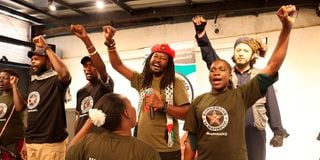
Kongomano la Mapinduzi activists at Mageuzi Hub in Nairobi on December 15, 2024. They said that they will hold peaceful processions in all counties to light candles on December 25 in memory of those who were killed in Gen Z protests.
“Where is my son?” The chilling words of a parent deep in despair hit me in the pit of my stomach. Spoken on the last day of 2024, these words must frame the year that was, and set the tone for the deepening demand for justice, accountability and respect for the rule of law in the year ahead.
Because any of us, Gen Zote, must be shaken to our core if we have any ounce of empathy. Where are our sons and daughters? How can we tolerate abductions, enforced disappearances, and extrajudicial killings in Kenya today? It is a stark contradiction that we aspire to be one of Africa’s most progressive nations while grappling with such an archaic and brutal reality. This is not just a crisis; it is a profound moral failure that demands our urgent attention and action.
This year marked a political awakening for Kenyans and Africans alike. A powerful example emerged in June when young Kenyans took to the streets nationwide, demanding accountability and an end to impunity.
They protested an oppressive Finance Bill 2024, outraged by increased taxes on essential goods amid unacceptably high unemployment rates. The government’s disconnect from the prevailing economic reality was glaring, highlighting a stark contrast between our progressive aspirations and the harsh truths lived by citizens.
Young Kenyans mobilised online to educate themselves and their parents. By leveraging crowd-sourced resources, they collaborated to simplify complex legal documents and translated the information into local languages. They were not only clear about what they opposed but, more importantly, about what they wanted. Their message? Taxation without accountability is extortion.
These digital natives changed the rules of the game. They redefined civic engagement using technology to activate a decentralised movement that was non-partisan, tribeless, leaderless and fearless.
We must celebrate that they are a well informed and civic minded generation. Their demand for fairness, equity and justice was impossible to ignore. It is safe to say that 2024 ushered in a new standard of doing business in Kenya and set new expectations for accountability and integrity in politics.
Last year Kenya also felt the devastating effects of climate change—2024 was the hottest on record, and the floods that swept across the nation disproportionately impacted people from lower income areas.
The floods left a wave of destruction, with lives lost and homes, schools, roads, farms and livelihoods destroyed, causing millions of shillings in losses and damages.
African voices were heard loud and clear, voicing dissatisfaction with the quantity and quality of climate finance.
With South Africa taking over the G20 leadership, we have to take a stand. South Africa has set the tone with its tenure, embracing the theme of “Solidarity, Equality and Sustainability”. This is a call to action that cannot be ignored, but rather one that must unite Africa to demand the accountability and support necessary and due for a sustainable future.
And finally, 2024 was the 20th anniversary of my mother, Prof. Wangari Maathai, winning the Nobel Peace Prize. She believed in protecting and restoring the environment and ensuring that the benefits from a thriving ecosystem accrue to present and future generations.
Beginning nearly half a century ago, throughout the 80s, 90s and 2000s, with the Green Belt Movement, she mobilised local communities to plant trees in rural areas and in our forests to stop the adverse effects of climate change and biodiversity loss, and fought to save Uhuru Park and Karura Forest so that they remain public spaces available to all.
The Nobel Peace Prize recognised and awarded her courage and resilience, her refusal to be daunted by barriers, and celebrated her singular clarity of purpose. Today we face similar battles: a crisis of corruption, a crippling trust deficit in government and an economic crisis exacerbated by unsustainable debt.
As we enter 2025, we must create a nation that embodies hope and opportunity for all. What vision will get us there? How can we cultivate an environment where every individual has access to transformative opportunities and the means to thrive? How do we ensure that nature and biodiversity are the foundations of our health and well-being?
The challenges we face demand our collective wisdom, integrity, and accountability. They call for a comprehensive, systems-oriented approach that goes beyond quick fixes and embraces long-term solutions. These issues cannot be addressed in an ad hoc and reactionary manner. Solutions must instead be bold, proactive, intentional and integrated.
This year, we will continue to explore in this column the solutions that will allow us to get to the Kenya we want and deserve.
Ms Mathai is the MD for Africa & Global Partnerships at the World Resources Institute and Chair of the Wangari Maathai Foundation.










